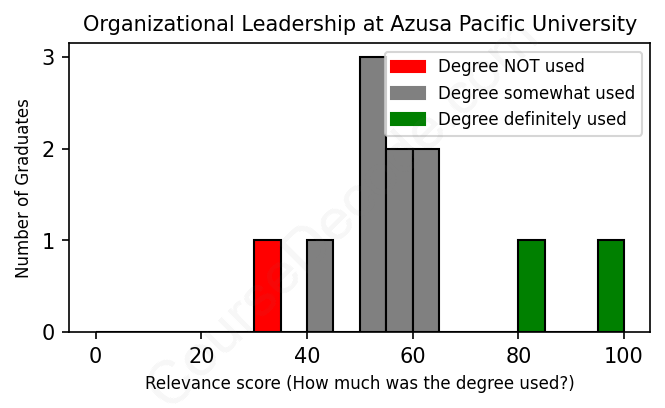
First, some facts. Of the Organizational Leadership graduates from Azusa Pacific University we've analyzed , here's how many have used (or NOT used) their degree in their career:

These are estimates based on AI analysis of 11 LinkedIn profiles (see below).
The verdict? Below average. Overall, with an average relevance score of 58%, Organizational Leadership graduates from Azusa Pacific University have a lower likelihood (-9%) of finding work in this field compared to the average graduate across all fields:
And for comparison, here's the chart for all profiles we've looked at across all degrees.
Also, after graduating, 45% of these graduates have pursued further education other than another Bachelor's degree (such as a Masters degree or other), compared to the average across all profiles of 35%. This suggests you may need more than just a Bachelors degree to be competitive as a Organizational Leadership graduate.
See the details:
|
Relevance score: 33% We think this person has NOT gone into a career related to their degree. We think this person has NOT gone into a career related to their degree.
DEGREE INFOGraduated in 2014 from Azusa Pacific University with a Bachelor of Science (B.S.) in Organizational Leadership. Also pursued further education since (see below). JOB HISTORY SINCE GRADUATIONOffice Manager San Diego Brain Works Jan 2015 - Jul 2015 Contact Center Representative  Imaging Healthcare Specialists Jul 2015 - Dec 2016 PET CT Coordinator  Imaging Healthcare Specialists Jul 2015 - Dec 2016 Breast Biopsy Coordinator  Imaging Healthcare Specialists Apr 2016 - Dec 2016 Call Center Specialist  UC San Diego Health Jan 2017 - Sep 2018 Neurophysiology Lab Scheduler  UC San Diego Health Sep 2018 - Apr 2021 Front Office Coordinator  UC San Diego Health Apr 2021 - Jan 2022 Referral Coordinator  UC San Diego Health Jan 2022 - Sep 2022 Appointment Scheduler  Altais May 2023 - Aug 2023 Team Lead  Altais May 2023 - Jan 2024 Supervisor  Altais Jan 2024 - Present FURTHER DEGREES DONE SINCE GRADUATINGAssociate's degreeHR Certification Institute 2017 - 2018 ABOUTNo information provided. |
The top 10 most common jobs done by the graduates we've analyzed (ranked most common to least) are:
Looking at the job titles of people who graduated with a degree in Organizational Leadership from Azusa Pacific University, we can see a mix of roles that vary significantly in how closely they relate to the core principles of organizational leadership. Many alumni have landed positions such as data analysts, administrative roles, and nursing jobs, which often emphasize operational skills more than leadership strategies. Although some of these positions, like the Energy Efficiency Consultant or various managerial roles, directly leverage leadership skills and strategic planning, a notable number of roles focus on specialized fields such as healthcare, administration, or sales, where the direct application of organizational leadership knowledge is less apparent.
Overall, while a few graduates effectively utilize their leadership training in strategic and managerial roles, many others find themselves in occupations that do not significantly require the organizational leadership principles they studied. It's a bit mixed—those who have taken on higher-level positions or managerial roles tend to find a clearer connection to their degree, while others in more technical or supportive functions seem less engaged with the core competencies of organizational leadership. So, it's essential for future graduates to consider how they might apply their skills in roles that truly match their education if they want to leverage that degree effectively in their careers.
Here is a visual representation of the most common words in job titles for Organizational Leadership graduates (this is across all Organizational Leadership graduates we've analyzed, not just those who went to Azusa Pacific University):

Graduates with a degree in Organizational Leadership from Azusa Pacific University seem to have a diverse range of career paths, but many of them do land jobs that are relevant to leadership and management shortly after graduation. For those graduating around 2010 to 2014, the first jobs often involve roles like instructors or coordinators, often within healthcare or educational settings. It seems that many graduates continued to hold positions related to management, data analysis, or even went into specialized fields like sustainability or real estate. This mix suggests that while some might have taken a bit to find their footing right out of college, they eventually found roles that utilize their leadership skills effectively.
Five to ten years down the line, many graduates have moved into more advanced roles, often achieving managerial or leadership positions. For instance, they’ve transitioned from entry-level jobs to roles like Business Manager, Sustainability Manager, or even self-employed positions. Some have continued along specific tracks in healthcare, education, or organizational management, showcasing good growth in their careers. While there are a few who have explored varied paths, such as working in the mortgage sector or as consultants, the overall trend appears positive. Most graduates utilize their degrees to find relevant positions that align with their skills, particularly in environments where leadership and organizational skills are essential. So, if you're considering this degree, it looks like a solid investment for those looking to build successful careers!
Getting a Bachelor’s degree in Organizational Leadership at Azusa Pacific University, or really anywhere, is usually a pretty manageable route, especially if you're someone who enjoys working with people and diving into group dynamics. The coursework often focuses more on real-world applications and leadership theories rather than super complex math or heavy technical subjects, so it tends to be on the easier side compared to more technical degrees like engineering or computer science. That said, it can still be challenging if you’re not into group projects or engaging discussions, since those are a big part of the experience. Overall, if you stay organized and engage with the material, you’ll probably find it to be a rewarding journey!
Most commonly, in the LinkedIn profiles we've looked at, it takes people 2 years to finish a Bachelor degree in Organizational Leadership.
Looking at the job histories of these Azusa Pacific University grads, it seems like they've carved out some decent career paths, but the pay could vary quite a bit. The earlier graduates, especially those in education or healthcare roles like a medical instructor or a nursing position, probably started off with relatively modest salaries, which is pretty typical for those fields. As for the more recent grads, some have taken on roles with titles that suggest higher responsibility, like VP of Sustainability or Business Manager, which typically comes with better pay, especially in growing sectors like energy efficiency and higher education. Overall, while it's hard to pinpoint exact salaries without more info, it looks like many are on a trajectory to make decent money, especially as they gain experience and move into leadership positions.
Here is a visual representation of the most common words seen in the "about" section of LinkedIn profiles who have a Bachelor degree in Organizational Leadership (this is across all Organizational Leadership graduates we've analyzed, not just those who went to Azusa Pacific University). This may or may not be useful:

Here are all colleges offering a Bachelor degree in Organizational Leadership (ordered by the average relevance score of their Organizational Leadership graduates, best to worst) where we have analyzed at least 10 of their graduates:
| College | Score | Count |
|---|---|---|
 Texas A&M University-Commerce Texas A&M University-Commerce
|
74 | 16 |
 Arizona State University Arizona State University
|
72 | 23 |
 University of Louisville University of Louisville
|
69 | 10 |
 Purdue University Purdue University
|
67 | 12 |
 University of Charleston University of Charleston
|
67 | 17 |
 University of Cincinnati University of Cincinnati
|
66 | 13 |
 Trident University International Trident University International
|
65 | 10 |
 South Texas College South Texas College
|
65 | 11 |
 Southern Nazarene University Southern Nazarene University
|
63 | 15 |
 Ashford University Ashford University
|
58 | 20 |
 Azusa Pacific University Azusa Pacific University
|
58 | 11 |
 Northern Kentucky University Northern Kentucky University
|
57 | 25 |
 Wright State University Wright State University
|
52 | 24 |